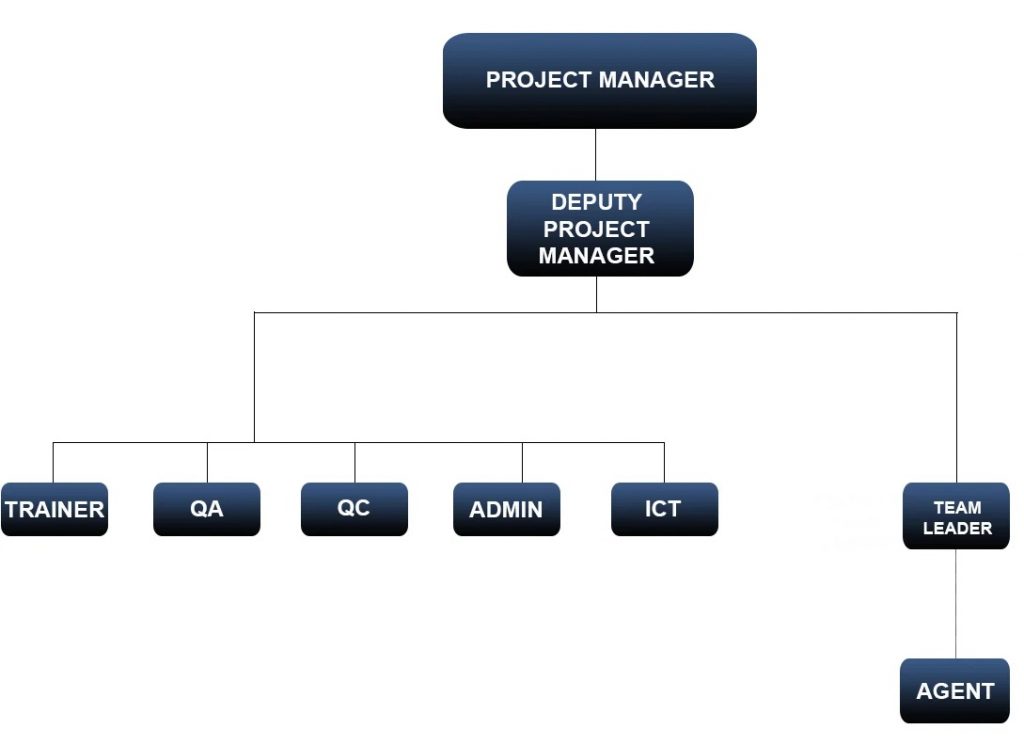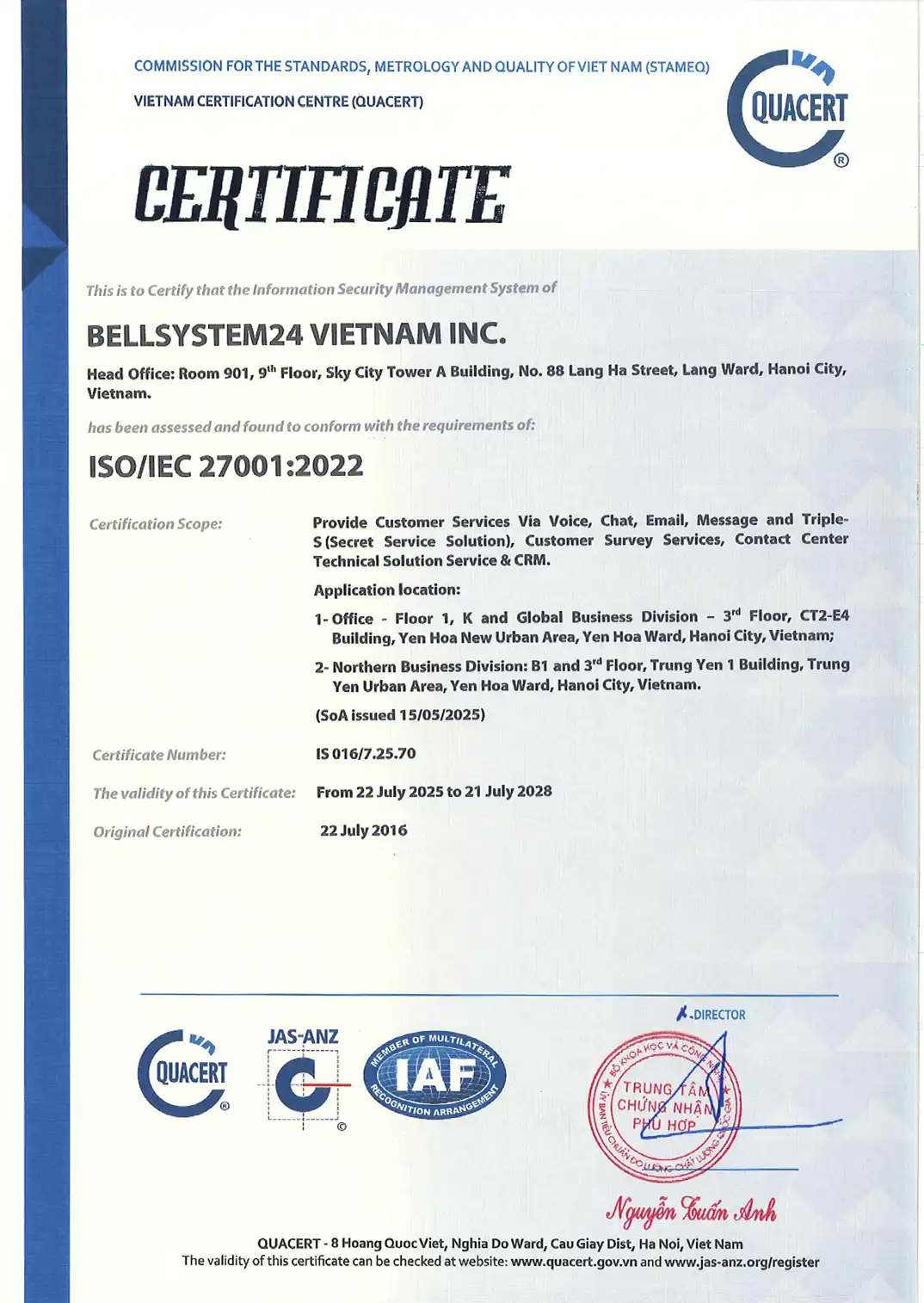Managing a telesales team is not only a job that requires patience, but also analytical skills, people management, and process optimization.
Những khó khăn mà người quản lý thường gặp như: Đội ngũ thiếu động lực, tỷ lệ chuyển đổi thấp, quy trình rời rạc, và thiếu công cụ hỗ trợ. Trong bài viết này, Bellsystem24 Việt Nam sẽ cung cấp hướng dẫn chi tiết để giải quyết từng vấn đề, giúp nâng cao hiệu quả và đưa đội ngũ telesale của bạn lên một tầm cao mới.

Bước đầu: Xác định mục tiêu Telesale
Trước khi xây mới hoặc đưa ra điều chỉnh, việc quan trọng là đánh giá và xác định mục tiêu (tổng thể, theo từng giai đoạn) để lên kế hoạch vận hành phù hợp. Đây là bước quan trọng, quyết định thành bại vì nó sẽ ảnh hưởng đến toàn bộ hoạt động.
Thời hạn mục tiêu
Dù mục tiêu của của bạn là gì, nó cũng cần có thời hạn.
- Long-term: Full-time, over 1 year.
- Medium term: From 6 months to 1 year.
- Short-term: From 1 to 6 months.
- According to the campaign.
The objectives must be measurable and adhere to the SMART principle.
Một số chỉ số đo lường hiệu quả telesale phổ biến:
- Revenue.
- Profit.
- Profit and Loss (PnL).
- Sales volume.
- etc.
Mục tiêu cần tuân thủ nguyên tắc SMART, bao gồm: S – Specific: Specific, clear, easy to understand. M – Measurable: Can be measured. A – Achievable: Suitable for the capabilities of the personnel. R – Realistic: Realistic. T – Time bound: Deadline for achieving targets.
See also: Common telesales performance metrics
Develop standard operating procedures
Operating procedures are the backbone of any telesales department. To build an effective process, you need to follow these steps.
1. Clear customer segmentation
- Identify target customer groups based on demographics, behavior, and needs.
- Build a clear customer profile so that the entire team can understand it.
- Use historical data to identify the customer group with the highest conversion rate.
=> Phân khúc khách hàng lý tưởng cần đáp ứng 3 tiêu chí cơ bản: Có nhu cầu sử dụng, có khả năng mua, doanh nghiệp có thể tiếp cận (qua kênh telesale).
2. Develop detailed telesales approaches and scenarios
- Test and determine which customer approach and care methods are effective (Test on multiple subjects at different times).
- Create scripts tailored to each customer group, including open-ended questions to elicit information and specific solutions for each customer's issues.
- The script needs to be flexible, avoiding rote learning.
See also: Effective telesales script template
3. Training and practice
- Train staff on products, services, and rejection handling skills.
- Regularly organize practice sessions and role-plays to improve communication skills.
- Develop "learn and ask" programs so that all members can openly share their difficulties and experiences during the work process.
4. Continuous monitoring and optimization:
- Measure metrics against business objectives and implement continuous improvement.
- Record calls to evaluate quality, learn lessons, and retrain.
- Collect feedback from customers to adjust the process.
See also: Top 6 metrics for measuring and evaluating telesales effectiveness
Human resource management
People are the decisive factor in success or failure, and this is also the issue that causes many telesales managers the most headaches. To manage your team effectively, you need to focus on four aspects: building an optimal telesales department structure, recruiting, training, and motivating.
Establish a telesales department structure
Build a telesales department structure to optimize operations, ensure smooth coordination, create diversity, and maintain a competitive spirit within the team.

Reference: Telesales department organizational structure
Hiring the right people
- Seek candidates with strong communication skills, a positive attitude, and the ability to work under pressure.
- Assess the candidate's potential for long-term commitment.
- Use situational simulation tests to select the most suitable candidates.
Continuing education
- Develop training programs not only on products but also on persuasion skills, time management, and handling rejection.
- Apply a one-on-one mentoring approach to help new employees quickly get up to speed and practice role-playing various scenarios.
- Implement retraining and upskilling programs to enhance capabilities.
Example of the telesales training process at Bellsystem24 Vietnam

Encourage and recognize
- Set specific, realistic goals with appropriate rewards for achieving them.
- Regularly organize team meetings and orientations to listen to employees' opinions and recognize their efforts.
- Organize periodic review and recognition programs.
- Conduct periodic performance evaluations and consider promotions and salary increases based on career paths.

Evaluating telesales effectiveness
To accurately assess the effectiveness of your telesales team, you need to apply specific KPIs. For more information, see the article: Top 6 metrics for measuring and evaluating telesales effectiveness
Improving telesales effectiveness
Managing telesales is a continuous improvement process. Here are some ways you can apply it:
Application of new technology
- Use CRM software to manage customer data, track progress, and automate repetitive tasks.
A/B Testing
- Test different approaches to find the optimal strategy.
Learn from the market
- Monitor your competitors and apply their effective strategies to your team.
Tools to support telesales management
Technology plays an important role in improving telesales management efficiency. Here are some useful tools:
- Software CRM: Manage customer data, track communication history, and classify potential customers.
- KPI measurement tool: Helps you monitor team performance in real time.
- Call automation software: Optimizes call time and reduces manual work for call center agents by auto call software.
- Voice analysis tool: Evaluates call quality and provides detailed feedback.

Essential skills for telesales managers
A skilled telesales manager needs not only professional skills but also leadership and inspirational abilities. Important skills include:
- Communication skills:
- Know how to communicate clearly and persuasively.
- Listen to employees and customers to come up with appropriate solutions.
- Analytical skills:
- Read and understand the data to make the right decisions.
- Analyze the strengths and weaknesses of the team to improve performance.
- Leadership skills:
- Motivate and create a positive work environment.
- Set a clear vision and guide the team to achieve the goals.
Managing telesales is no easy journey; it requires a combination of well-thought-out strategy and flexible leadership. With clear processes, a well-trained team, robust technology support, and continuous improvement, you can turn challenges into opportunities, building a telesales team that not only operates effectively but also creates long-term value for your business. Start with small steps, be persistent, and always innovate to achieve greater success.







